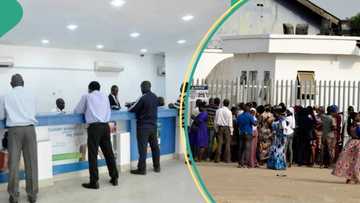Fitch Identifies Banks That Could Merge Over New CBN Capital Requirements
- Report has stated that Tier-3 banks have a higher propensity to merge or degrade their licenses
- This could happen when they struggle to achieve the higher paid-in capital requirements set by the CBN
- To comply, banks can raise new equity, lower their licenses, or combine with other organisations
Legit.ng journalist Zainab Iwayemi has 5-year-experience covering the Economy, Technology, and Capital Market.
Tier-3 banks in Nigeria are more likely to downgrade their licenses or engage in mergers and acquisitions.

Source: Getty Images
According to Fitch Ratings, this could occur as they find it difficult to meet the Central Bank of Nigeria's increased paid-in capital standards.
While first- and tier-2 banks had made significant strides in obtaining new capital, the global credit rating agency said in a report released on Wednesday that tier-3 lenders had been sluggish in their efforts to recapitalize, which made license downgrades or consolidation a more likely route to compliance.
It noted, “M&A activity and licence downgrades remain more likely among third-tier banks.”
Options to raise capital
The CBN significantly raised the paid-in capital requirements for all of the nation's commercial, merchant, and non-interest banks in March 2024.
By requiring a higher capital level, the new rule seeks to increase financial stability and guarantee that banks have enough buffers to withstand shocks to the economy.
Banks can either downgrade their licenses, raise new equity, or merge with other institutions to comply.
Third-tier banks have had difficulty luring the required investments, while larger banks have used capital markets and shareholder support to raise money.
Third-tier banks have not kept up with the efforts of larger banks, which have successfully raised capital to keep their current licenses.
According to the Fitch study, many banks still needed to finalize their capital-raising plans or secure shareholder approval.

Read also
High demand for naira: Banks borrowing from CBN increases to N4.7 trillion as deposits crash
Union Bank of Nigeria is one of the banks still going through the recapitalization process, and it continues to fall short of the CBN's 10% Capital Adequacy Ratio standard.
In a similar vein, Wema Bank is anticipated to start fundraising by April 2025 after receiving shareholder approval to raise funds in order to maintain its national banking license.
Although the board has approved Coronation Merchant Bank's capital raising plan, it is still unclear what the bank would do next.
To meet the CBN's regulatory requirements, the credit rating agency cautioned that these banks may have little choice but to downgrade their banking licenses or merge with more powerful organizations if they don't act quickly to obtain new funding.
Major financial institutions have made significant strides in achieving the new capital requirements, while smaller banks continue to confront challenges.
Zenith Bank and Access Bank have already raised enough money to satisfy the N500 billion requirement for foreign banking licenses.

Read also
Fidelity Bank gets approval to proceed with second phase of its capital-raising initiatives
For their recent rights offers, First HoldCo, United Bank for Africa, and Guaranty Trust Holding Company have used a phased strategy, raising cash in tranches. Some of these companies are still awaiting final regulatory clearances.
Second-tier lenders Fidelity Bank and FCMB Group have finished their first capital raising rounds, but they will still need to raise more money to keep their international banking licenses.
Additionally, Fitch pointed out that Ecobank Nigeria and Jaiz Bank had already reached the regulatory threshold and simply needed small capital infusions.
Ecobank Nigeria, on the other hand, has plans to bring itself back into compliance with the 10% Capital Adequacy Ratio standard.
Investor mood regarding capital raising has remained favorable despite the economic difficulties, allowing the majority of top and mid-tier banks to successfully raise cash.
Speaking on the new capital requirement, Charles Abuede, a financial analyst told Legit.ng,
"The move to increase banks' minimum capital requirement is not a bad idea, considering that it would have significant growth impact on the banking industry as a result of more investments, which could come in form of foreign direct investments or investments from the domestic front."
Some banks set to hit CBN requirements
Legit.ng reported that all indicators show that several Nigerian banks are on course to meet and surpass the Central Bank of Nigeria’s (CBN) recapitalisation targets even before the March 2026 deadline.
Several big players in Nigeria’s banking industry like FCMB and GTCO have completed the first part of their capital raise efforts, through public offers and rights issues, or private placement in a few cases.
Interestingly, the market outlook remains positive, especially given the enthusiasm that has driven already completed capital raising exercises.
PAY ATTENTION: Сheck out news that is picked exactly for YOU ➡️ find the “Recommended for you” block on the home page and enjoy!
Source: Legit.ng




